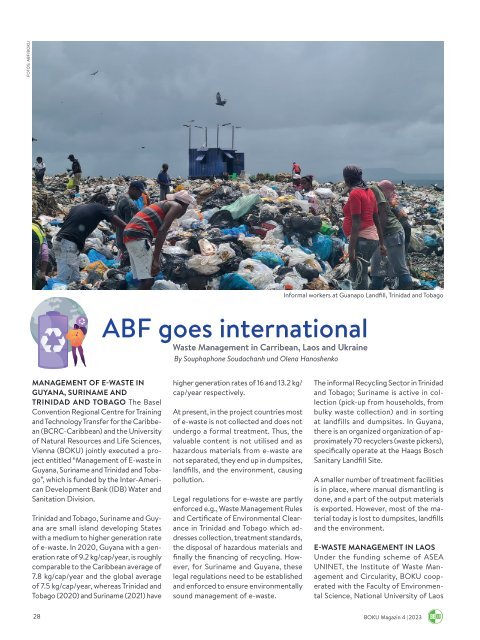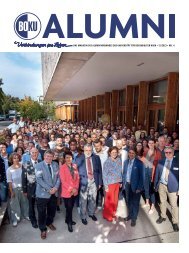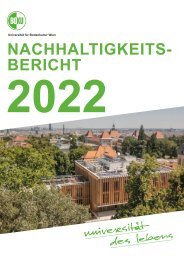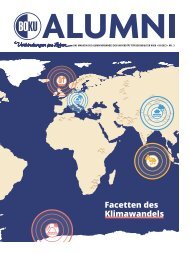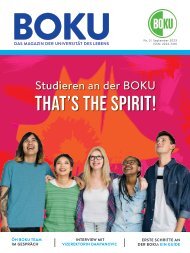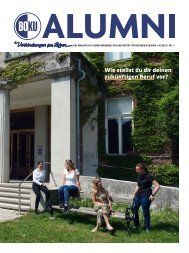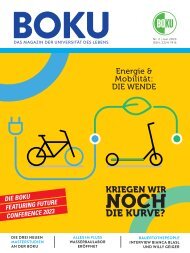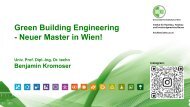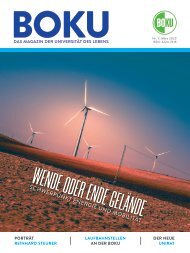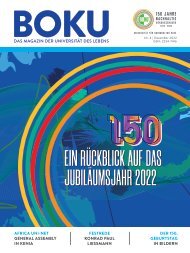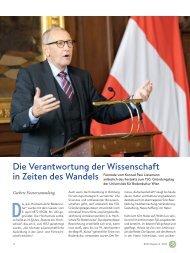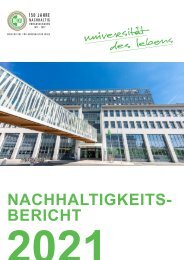BOKU Magazin 4/2023
Inhalt Editorial Marion Huber-Humer im Interview Einwegpfand in Österreich Lebensmittabfälle in den Haushalten Elektroaltgeräte: Wertvoll und gefährlich Dem Mikroplastik auf der Spur Safe and Sustainable by Design „Nanocarrier“ auf dem Prüfstand Schlüsselressource Biogene Abfälle Plastic Pirates ABF goes international Making BOKU the hub for bioeconomy Der BOKU-Nachhaltigkeitsbericht Demokratie in der Klimakrise: Der BOKU-Nachhaltigkeitstag 2023 Im Höhenflug zum BOKU-Ball Helmut Habersack „Österreicher des Jahres“ BOKU-Student im Jungbauernkalender Das neue Hinweisgebersystem an der BOKU Abend des Lehrens und Lernens Interview Ars docendi-Anerkennungspreis Lehrveranstaltung Citizen Science Project4 (Gender & Diversity) Neue Kolumne Citizen Science Splitter Forschung: FAQ / ERC Grants Kreislaufwirtschaft in der BASE:academy Start-up Hut & Stiel Strategische Kooperation BOKU – Umweltbundesamt BOKU-Diversitätspreis für Forschung
Inhalt
Editorial
Marion Huber-Humer im Interview
Einwegpfand in Österreich
Lebensmittabfälle in den Haushalten
Elektroaltgeräte: Wertvoll und gefährlich
Dem Mikroplastik auf der Spur
Safe and Sustainable by Design
„Nanocarrier“ auf dem Prüfstand
Schlüsselressource Biogene Abfälle
Plastic Pirates
ABF goes international
Making BOKU the hub for bioeconomy
Der BOKU-Nachhaltigkeitsbericht
Demokratie in der Klimakrise: Der BOKU-Nachhaltigkeitstag 2023
Im Höhenflug zum BOKU-Ball
Helmut Habersack „Österreicher des Jahres“
BOKU-Student im Jungbauernkalender
Das neue Hinweisgebersystem an der BOKU
Abend des Lehrens und Lernens
Interview Ars docendi-Anerkennungspreis
Lehrveranstaltung Citizen Science Project4
(Gender & Diversity)
Neue Kolumne Citizen Science
Splitter
Forschung: FAQ / ERC Grants
Kreislaufwirtschaft in der BASE:academy
Start-up Hut & Stiel
Strategische Kooperation BOKU – Umweltbundesamt
BOKU-Diversitätspreis für Forschung
Erfolgreiche ePaper selbst erstellen
Machen Sie aus Ihren PDF Publikationen ein blätterbares Flipbook mit unserer einzigartigen Google optimierten e-Paper Software.
FOTOS: ABF/<strong>BOKU</strong><br />
Informal workers at Guanapo Landfill, Trinidad and Tobago<br />
ABF goes international<br />
Waste Management in Carribean, Laos and Ukraine<br />
By Souphaphone Soudachanh und Olena Hanoshenko<br />
MANAGEMENT OF E-WASTE IN<br />
GUYANA, SURINAME AND<br />
TRINIDAD AND TOBAGO The Basel<br />
Convention Regional Centre for Training<br />
and Techno logy Transfer for the Caribbean<br />
(BCRC-Caribbean) and the University<br />
of Natural Resources and Life Sciences,<br />
Vienna (<strong>BOKU</strong>) jointly executed a project<br />
entitled “Management of E-waste in<br />
Guyana, Suriname and Trinidad and Tobago”,<br />
which is funded by the Inter-American<br />
Development Bank (IDB) Water and<br />
Sanitation Division.<br />
Trinidad and Tobago, Suriname and Guyana<br />
are small island developing States<br />
with a medium to higher generation rate<br />
of e-waste. In 2020, Guyana with a generation<br />
rate of 9.2 kg/cap/year, is roughly<br />
comparable to the Caribbean average of<br />
7.8 kg/cap/year and the global average<br />
of 7.5 kg/cap/year, whereas Trinidad and<br />
Tobago (2020) and Suriname (2021) have<br />
higher generation rates of 16 and 13.2 kg/<br />
cap/year respectively.<br />
At present, in the project countries most<br />
of e-waste is not collected and does not<br />
undergo a formal treatment. Thus, the<br />
valuable content is not utilised and as<br />
hazardous materials from e-waste are<br />
not separated, they end up in dumpsites,<br />
landfills, and the environment, causing<br />
pollution.<br />
Legal regulations for e-waste are partly<br />
enforced e.g., Waste Management Rules<br />
and Certificate of Environmental Clearance<br />
in Trinidad and Tobago which addresses<br />
collection, treatment standards,<br />
the disposal of hazardous materials and<br />
finally the financing of recycling. However,<br />
for Suriname and Guyana, these<br />
legal regulations need to be established<br />
and enforced to ensure environmentally<br />
sound management of e-waste.<br />
The informal Recycling Sector in Trinidad<br />
and Tobago; Suriname is active in collection<br />
(pick-up from households, from<br />
bulky waste collection) and in sorting<br />
at landfills and dumpsites. In Guyana,<br />
there is an organized organization of approximately<br />
70 recyclers (waste pickers),<br />
specifically operate at the Haags Bosch<br />
Sanitary Landfill Site.<br />
A smaller number of treatment facilities<br />
is in place, where manual dismantling is<br />
done, and a part of the output materials<br />
is exported. However, most of the material<br />
today is lost to dumpsites, landfills<br />
and the environment.<br />
E-WASTE MANAGEMENT IN LAOS<br />
Under the funding scheme of ASEA<br />
UNINET, the Institute of Waste Management<br />
and Circularity, <strong>BOKU</strong> cooperated<br />
with the Faculty of Environmental<br />
Science, National University of Laos<br />
28 <strong>BOKU</strong> <strong>Magazin</strong> 4 | <strong>2023</strong>


